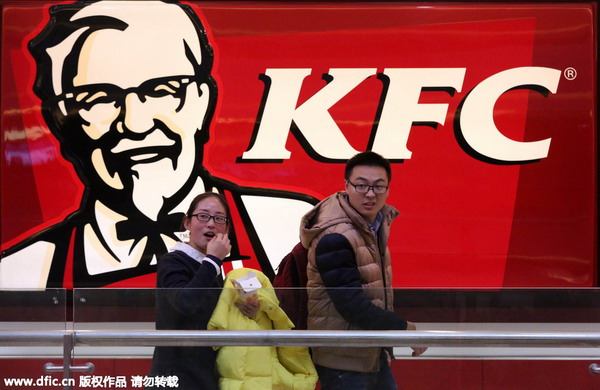KFC sues 3 firms for rumors on social media
By Wang Zhuoqiong (China Daily) Updated: 2015-06-02 07:34
People walk past a fastfood restaurant of KFC in Huaian city, East China's Jiangsu province, Feb 14, 2015. [Photo / IC]
Fast-food chain says companies spread false claims on food quality, seeks compensation

Fast food giant KFC said on Monday that it has filed lawsuits against three Chinese companies, whose social media accounts spread false claims about the quality of its food.
KFC, a unit of the United States-based Yum Brands Inc, said lawsuits have been brought against 10 public accounts of the three companies that spread rumors and it has asked for 3.5 million yuan ($564,500) in compensation.
The company filed a plea in Shanghai's Xuhui district people's court on Friday asking the three companies to immediately stop the copyright infringement and offer an apology. It asked for a maximum compensation of 1.5 million yuan from a defendant company in Shenzhen and 1 million each from two defendant companies in Shanxi province.
KFC said in its complaint that it was hard for companies to protect their brands against rumors because of the difficulties in collecting evidence. It said the three companies had operated the accounts on the popular mobile phone app WeChat and this was a major obstacle for gathering evidence.
By the end of April, there were more than 4,000 postings against KFC on the public WeChat accounts. At least 130 accounts had such postings wherein the viewer numbers exceeded 100,000. "It is not only seriously misleading consumers, but also harms the brand," said a statement issued by KFC.
The postings against KFC include a story that chicken raised at the KFC farms were genetically modified and had six wings and eight legs.
Tencent Holdings Ltd, the company which operates the WeChat service, declined to comment on the issue.
The legal dispute comes amid Tencent's own efforts to fight rumors on the WeChat platform. In March, the social-networking giant issued a set of regulations that detail inappropriate and illegal behavior that are forbidden on WeChat. It said anyone who takes advantage of the instant messaging platform to spread rumors will be punished.
To curb the prevalence of rumors, WeChat also established a mechanism by partnering with public media accounts, which release official statements as soon as a rumor is detected on the platform. Despite these efforts, analysts said it is next to impossible to stamp out rumors given the massive user base of WeChat.
The platform has 500 million active users, while corporate public accounts on the platform exceeded 5.8 million as of July 2014.
Yang Guang, who is in charge of security issues on WeChat, said in an April meeting that: "It is difficult to root out rumors but WeChat will spare no efforts to deal with them."
Yum Brands, the parent company of Taco Bell, KFC and Pizza Hut, has been struggling in China, where sales declined 6 percent in the first quarter, while same-store sales fell 12 percent.
The result was an improvement over the 16 percent same-store sales decline in the last quarter of 2014, and the company still insists it plans to add at least 700 new stores in China.
Yum has launched several initiatives to attract more customers in China including a high-end restaurant Atto Primo in Shanghai.
McDonald's Corp, the world's largest fast-food chain, is to close 350 stores globally, including 220 in China and the United States.
Analysts said customers in China have been slow to forget recent food scandals, one of which involved a major supplier of meat to fast-food companies including McDonald's and Yum, which was shut down for allegedly violating numerous safety regulations.
Ma Si contributed to this story.
- Hefei-Fuzhou railway line put into trial operation
- Lenovo's largest shareholder plans IPO in HK
- Catching the train provides the ideal shortcut
- Property sales hit new high
- Mainland money continues to fuel stock surge in HK
- Traveling the highways can fuel growth in vacation sector
- Driving into a picture postcard
- PMI up slightly in May vs April

















